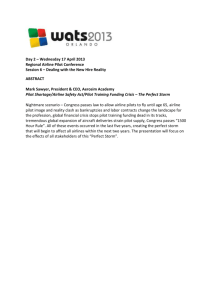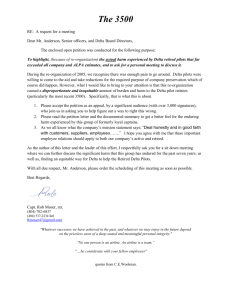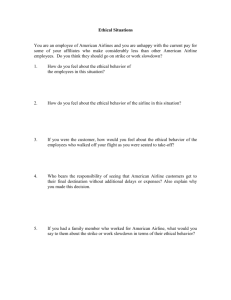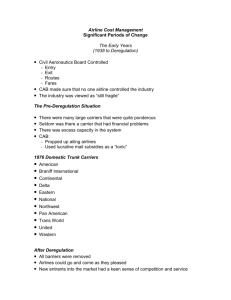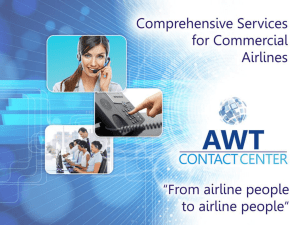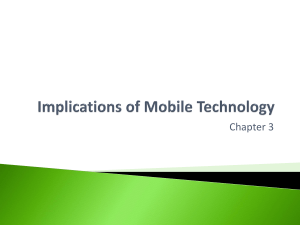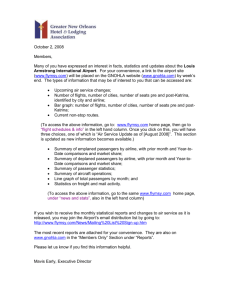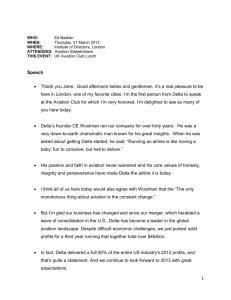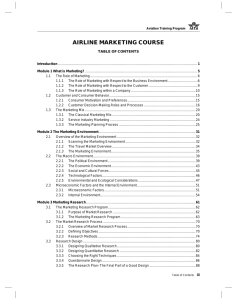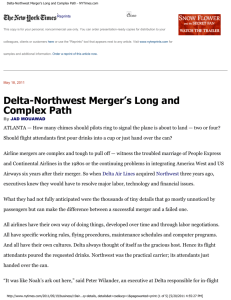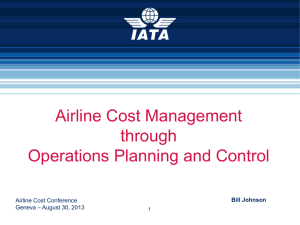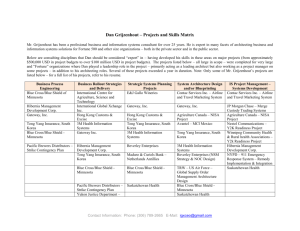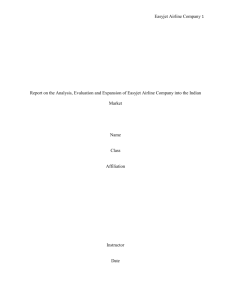An Interview with Kevin Donovan, the author of AIRLINE
advertisement
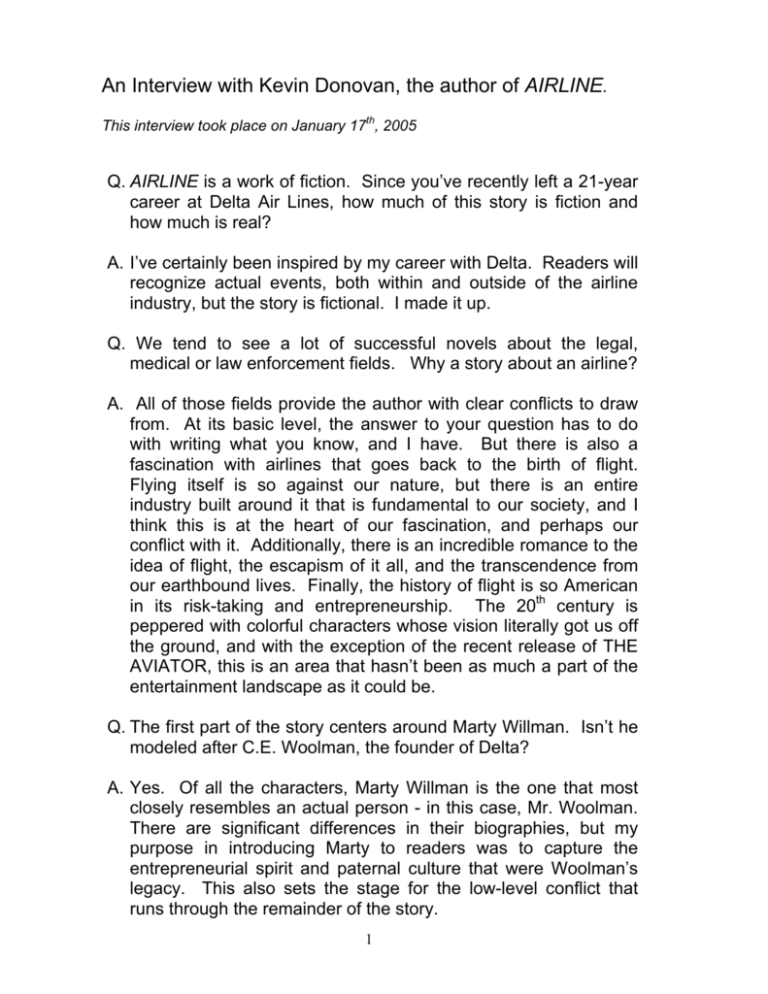
An Interview with Kevin Donovan, the author of AIRLINE. This interview took place on January 17th, 2005 Q. AIRLINE is a work of fiction. Since you’ve recently left a 21-year career at Delta Air Lines, how much of this story is fiction and how much is real? A. I’ve certainly been inspired by my career with Delta. Readers will recognize actual events, both within and outside of the airline industry, but the story is fictional. I made it up. Q. We tend to see a lot of successful novels about the legal, medical or law enforcement fields. Why a story about an airline? A. All of those fields provide the author with clear conflicts to draw from. At its basic level, the answer to your question has to do with writing what you know, and I have. But there is also a fascination with airlines that goes back to the birth of flight. Flying itself is so against our nature, but there is an entire industry built around it that is fundamental to our society, and I think this is at the heart of our fascination, and perhaps our conflict with it. Additionally, there is an incredible romance to the idea of flight, the escapism of it all, and the transcendence from our earthbound lives. Finally, the history of flight is so American in its risk-taking and entrepreneurship. The 20th century is peppered with colorful characters whose vision literally got us off the ground, and with the exception of the recent release of THE AVIATOR, this is an area that hasn’t been as much a part of the entertainment landscape as it could be. Q. The first part of the story centers around Marty Willman. Isn’t he modeled after C.E. Woolman, the founder of Delta? A. Yes. Of all the characters, Marty Willman is the one that most closely resembles an actual person - in this case, Mr. Woolman. There are significant differences in their biographies, but my purpose in introducing Marty to readers was to capture the entrepreneurial spirit and paternal culture that were Woolman’s legacy. This also sets the stage for the low-level conflict that runs through the remainder of the story. 1 Q. Which is? A. The corporation vs. the people. I asked myself these questions through much of my career: What is a corporation? Is it a “family” or just a gathering of employees with a so-called common goal? How should people relate to their corporation and how should the corporation treat its employees? In many respects it is both a family and a conglomeration, if you will, and these elements are in conflict. I don’t take a position on which of the two should win out because I really don’t know the answer to the question; there are legitimate arguments for both extremes. But I am fascinated by the idea of loyalty to a corporation and what it means to the soul of the individual employee and the success of the enterprise. There is a fundamental conflict there that many people can relate to. Q. What will Delta think of this book? A. It probably is going to depend on who you ask, but in general I think my presentation of the fictional airline is well-balanced. There are very good things and very bad things. At its core, this is essentially a reflection of the human element as it goes up against sometimes inhuman circumstances. Q. Caroline and Danny are the protagonists in the remainder of the book. Tell us about them and who they are inspired by. A. Both of them have elements of several people, but they are their own characters. I begin with Danny, in part because he was the vehicle for my personal experiences, but as I wrote the book, Caroline became the heart and soul of the story. Her integrity and courage are things we would all do well to aspire to. She’s my hero. Q. You also have a very unsympathetic character named Jeff, who is a pilot. This presents an especially negative picture of the average pilot, doesn’t it? A. I realize that, and I don’t think it’s fair to say that Jeff is representative of the average pilot. I would concede that he has 2 behavioral elements that are somewhat unique and perhaps slightly more prevalent among the pilot workforce, and that is what I was trying to isolate and elevate for the purpose of the story. But it’s just as important to note that, in the end, the strongest and most positive aspects that are representative of pilots are what come to the fore in Jeff. Q. And then of course, you have Wesley Arnold, the CEO through most of the story. Where does he come from? A. Wesley is the Darwinian product of corporate America. From a Machiavellian standpoint, he is a tremendously strong character, which is one of the reasons why I wanted to open the story with him. I really like Wesley – he is extremely clever in a dark sort of way, and that lends a lot of tension to the story. Q. There is a great deal of reflection about the south, and especially about Atlanta in the book. As a northerner, have you considered the reaction that many southerners might have to the negative observations you make? A. I have, and I am resigned to the fact that there are people who will take offense to the negative at the expense of seeing any of the positive. Similar to my treatment of other issues, I believe there is a healthy balance of positive and negative in the story. This book is not political commentary, but it does point out the variance in interpretations that remain between the north and the south. I think people will appreciate the fact that I have taken it to a deeper level of introspection through the eyes of my characters, and the end result is positive. I also am hopeful that the same southern passion for reading about themselves that created enduring successes out of Gone with the Wind and Midnight in the Garden will apply to this story. Q. Let’s talk some more about you. Why did you leave Delta? A. It was just time for me to go. It was one of those gut feelings that, after 21 years, I was doing the right thing by leaving - for both myself and the company. I had worked in three different cities with nine different jobs, and I felt like – for whatever reason – I was no longer able to make a contribution to their future 3 success. There were a lot of things that I wanted to do, but there was just no environment there for me to “move the ball” as they say. Despite that, I still have a significant emotional stake in the success of the company. I’ve made so many close friends – I can only wish them all the best at this point. Q. You actually dedicate the book to airline employees. Tell us why you felt compelled to do that. A. In some respects, I suppose that’s my way of saying “thanks for the memories”, but more importantly, I have been continually amazed at the dominant quality of commitment and dedication that people have for their jobs. Sure, we hear about the deterioration of service in the industry – I don’t question that, but there are other things going on behind the scenes that have led to those circumstances. That is not an excuse for the nightmares that many customers have experienced, but it should not take away from the noble qualities of the average employee. The vast majority of these people are highly professional and committed to customer service, despite so many things beyond their control, and that has been an inspiration to me over the years. Q. Do you have a sequel in mind for AIRLINE? A. Yes. My characters, with one exception, are still alive and well, and the last five years have certainly provided a lot of grist. Stay tuned! 4
